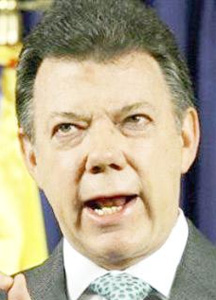It’s not unusual in Latin American politics for presidents to clash with their predecessors who once helped elect them, but the current feud between former Colombian President Alvaro Uribe and President Juan Manuel Santos goes beyond anything I’ve seen in a long time.
It’s a brutal verbal battle between two long-time allies that is shaking Colombia, and that — unless put to an end — could thwart that country’s recent emergence as a rising economic star in Latin America.
When I interviewed Uribe last week following a terrorist attack in Bogota that left two dead and about 50 wounded, I was surprised by the ferocity of Uribe’s criticism of Santos, who had been his former defence minister and protégé. Santos had campaigned vowing to continue Uribe’s security policies, but later improved ties with Venezuelan President Hugo Chávez, whom Uribe had openly accused of aiding Colombia’s FARC guerrillas.
 During the interview, Uribe said that there has been “an enormous mistake in the security policy of President Santos” that has resulted in a resurgence of guerrilla violence in Colombia.
During the interview, Uribe said that there has been “an enormous mistake in the security policy of President Santos” that has resulted in a resurgence of guerrilla violence in Colombia.
Referring to the terrorist attack in Bogota, which had targeted Uribe’s former Interior Minister Fernando Londono, Uribe said that “what happened last week could have been foretold several days sooner. Week after week, there have been terrorist attacks in several regions. During my government, these attacks were increasingly fewer. The big difference is that under my government, there was no hesitation to attack terrorism.”

Uribe asserted that “one of the big mistakes of the Santos administration has been to seek a [peace] agreement with the terrorist FARC group through the Chávez dictatorship in Venezuela.” He added, “that’s very serious, because it totally demoralizes the Colombian armed forces,” and because “the Chávez dictatorship is an accomplice of the FARC.”
When I asked him whether he is seeking to return to the presidency — he can’t run for the presidency under current laws, but there is speculation he may try to change the laws or find a loyal surrogate — Uribe asserted that he is not campaigning for the presidency, but for “maintaining the policies that have worked well for Colombia.”

Santos, in turn, has responded that since he took office in 2010, Colombia has won some of its biggest battles against the FARC rebels, including the killings of guerrilla leaders Mono Jojoy and Alfonso Cano. When asked about Uribe, Santos responds that his duty as president is to look toward the future, and that his predecessor “is part of the past.”
What’s behind Uribe’s offensive against his former protégé? There are three main theories:
• Uribe is trying to recover his place as the most powerful politician in Colombia by mobilizing his sympathizers through his 1.1 million Twitter followers, and constant appearances on Colombian media. He wants to regain absolute control of the ruling U Party, which is divided between pro-Santos and pro-Uribe wings, and force Santos to return to the previous security policies.
• Uribe is trying to control a majority in Congress, so as to govern from behind the scenes. He knows that the greater the perception that the security situation is deteriorating, the more Colombians yearn for his years in office, where Colombia — either thanks to him, or to his defence minister Santos — saw a drastic drop in guerrilla attacks.
• Uribe’s ultimate goal is to return to power, either directly — for instance, by running for vice president and later asking the No 1 on the ticket to step aside — or through a more docile candidate than Santos turned out to be.
My opinion: In most other countries, this feud wouldn’t be more than an anecdote within the political class. But in Colombia, where former presidents have always remained powerful political figures, and where Uribe has been a stronger president than most, the Uribe v Santos clash may ruin Colombia’s recent status as one of Latin America’s most rapidly growing economies, and one of the region’s biggest recipients of foreign investments.
What’s more, unless Uribe and Santos come to terms — or Uribe softens his attacks, or Santos starts to completely ignore them — the two leaders will split Colombia’s centre and centre-right vote, and deliver the next elections to a leftist candidate. Ironically, the biggest beneficiaries of their current feud will be their political adversaries.
© The Miami Herald, 2012. Distributed by Knight Ridder/Tribune Media Services.





